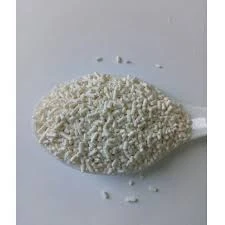
bread emulsifier
The Role of Bread Emulsifiers in Baking
Baking is a delicate science that combines various ingredients to create delicious and appealing bread. Among these ingredients, emulsifiers play a crucial role in enhancing the texture, flavor, and shelf life of baked goods. Bread emulsifiers are substances that help to mix ingredients that typically do not combine well, such as oil and water, leading to a more cohesive dough and ultimately a better product.
Understanding Emulsifiers
Emulsifiers are compounds that lower the surface tension between two immiscible liquids, allowing them to mix more thoroughly. In the context of bread making, emulsifiers help incorporate fats and oils into the dough, which is essential for achieving the desired crumb structure and moisture retention. Common emulsifiers used in bread production include mono- and diglycerides, lecithin, and polysorbates. Each of these emulsifiers has unique properties that affect the dough's behavior during mixing, fermentation, and baking.
Improving Dough Stability and Texture
One of the primary benefits of using emulsifiers in bread recipes is their ability to improve dough stability. By creating a strong interaction between the fat and flour, emulsifiers enhance the dough's elasticity, enabling it to hold gas produced during fermentation. This results in a lighter, airy bread with a more appealing texture. Additionally, emulsifiers help to improve the dough's tolerance to over-mixing or under-mixing, which is often a problem in industrial baking settings.
Moreover, emulsifiers contribute to the overall crumb structure of the bread. They help to create a finer, more uniform crumb, which is desirable in many types of bread, such as sandwich loaves. This uniformity not only improves the bread's appearance but also enhances its mouthfeel, making it more enjoyable to eat.
bread emulsifier

Extending Shelf Life
In today's fast-paced world, consumers appreciate the convenience of bread that stays fresh longer. Emulsifiers can significantly contribute to extending the shelf life of bread by slowing down staling. When bread stales, the starches in the bread retrograde, leading to a dry and crumbly texture. Emulsifiers help to retain moisture in the bread, keeping it soft and fresh for an extended period. This quality is particularly important for commercial bakers aiming to meet consumer demands for products that can be stored for longer durations without sacrificing taste or quality.
Economic Benefits
From an economic standpoint, incorporating emulsifiers can lead to cost savings for bakers. By improving the texture and shelf life of bread, bakers can reduce waste due to stale products and increase customer satisfaction. Additionally, the use of emulsifiers can expand the range of products that bakers can offer, allowing them to experiment with new recipes and forms of bread without compromising quality.
Conclusion
In summary, bread emulsifiers are essential components in the baking industry, contributing to improved dough stability, texture, and shelf life. They play a significant role in achieving the desired qualities in various bread products, meeting consumer preferences and enhancing the overall baking process. As technology continues to advance, the evolution of emulsifiers will likely lead to even more innovative baking solutions, making them an integral part of the future of bread production.
-
The Safety Challenges of Ammonium Nitrate FertilizerNewsJun.26,2025
-
The Critical Role of Mining ChemicalsNewsJun.26,2025
-
Shelf Life of Glacial Acetic Acid Food GradeNewsJun.26,2025
-
Enhancing PVC Longevity with 1,2,3-Benzotriazole InnovationsNewsJun.26,2025
-
China’s Dominance in Food Additive ProductionNewsJun.26,2025
-
Can Aluminum Hydroxide Replace More Toxic Alternatives?NewsJun.26,2025
-
PE and PP Plastics with Benzotriazole AdditivesNewsJun.12,2025
Hebei Tenger Chemical Technology Co., Ltd. focuses on the chemical industry and is committed to the export service of chemical raw materials.
-

view more DiethanolisopropanolamineIn the ever-growing field of chemical solutions, diethanolisopropanolamine (DEIPA) stands out as a versatile and important compound. Due to its unique chemical structure and properties, DEIPA is of interest to various industries including construction, personal care, and agriculture. -

view more TriisopropanolamineTriisopropanolamine (TIPA) alkanol amine substance, is a kind of alcohol amine compound with amino and alcohol hydroxyl, and because of its molecules contains both amino and hydroxyl. -

view more Tetramethyl Thiuram DisulfideTetramethyl thiuram disulfide, also known as TMTD, is a white to light-yellow powder with a distinct sulfur-like odor. It is soluble in organic solvents such as benzene, acetone, and ethyl acetate, making it highly versatile for use in different formulations. TMTD is known for its excellent vulcanization acceleration properties, which makes it a key ingredient in the production of rubber products. Additionally, it acts as an effective fungicide and bactericide, making it valuable in agricultural applications. Its high purity and stability ensure consistent performance, making it a preferred choice for manufacturers across various industries.











